Altitude Brewing on a huge high
Queenstown brewery wins Champion Small Brewery title at Aussie beer awards plus best modern pale ale. US-China tariff showdown good for Kiwi beer exporters. Aussie comedian rates our beers.
Welcome to Friday Night Beers — your weekly news drop of all things beer in New Zealand.
Today it’s a massive shout-out to the crew at Queenstown’s Altitude Brewing for their remarkable achievement at the Australian International Beer Awards last night in Melbourne!
Altitude were crowned Champion Small International Brewery and took home the trophy for Modern Pale Ale with their flagship beer Sled Dog.
They won four gold medals — Sled Dog, Crush Party Pilsner, Southern Lights NZ Pale Ale and Moments of Bliss IPA. In total, they had 24 medals from 26 entries with 14 silvers and six bronze. It was a HUGE night out.
Altitude have been a rising star for some time and even during the recession years they have defied the economic conditions and grew their annual production.
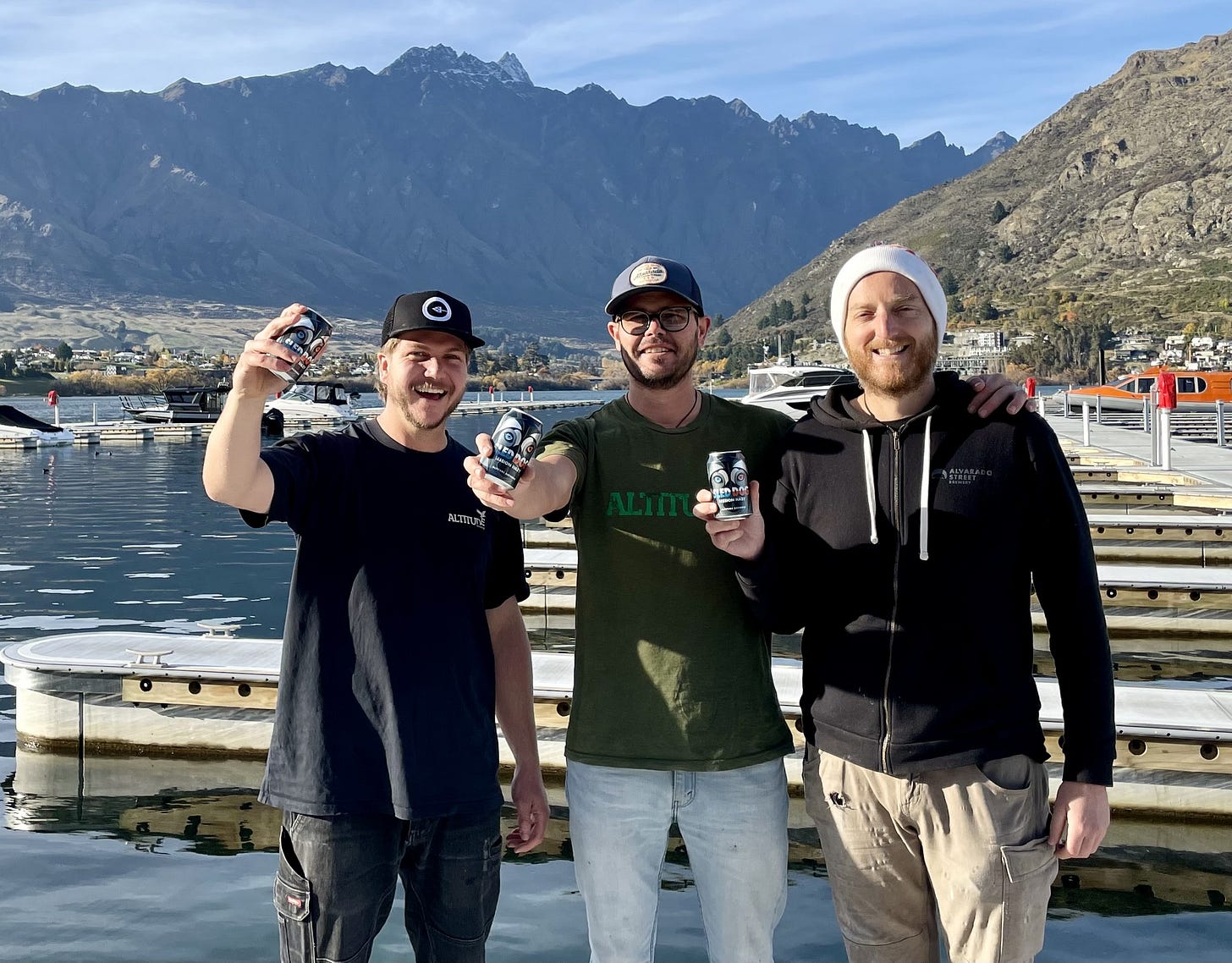
It’s the second time Altitude have taken out a champion small brewery award, having won that trophy at the New Zealand Beer Awards in 2021.
Sled Dog, a 4.5% session hazy, is their biggest-selling beer, especially in the taproom by the lake in Frankton.
Co-founder Eddie Gapper said: “Being crowned champion again, this time International Small Brewery, feels fantastic. The last few years have been a monumental challenge and our business strategy throughout was ‘Get Better’. Better beers, better margins, better process, better hospitality.
“Our production team has been relentless in pursuit of improvement — and to win Best Modern Pale Ale for Sled Dog Session Hazy shows our most popular beer is a crowd favourite for a reason.”
Shining Peak take home a trophy too
Shining Peak had an awesome night as well, winning the Barrel & Wood Aged trophy with — you heard it here first, remember — their Barrel Aged Feijoa Sour, which I raved about a couple of weeks back :)
Shining Peak won a total of three gold medals in the Barrel & Wood Aged class with the 2022 and 2023 Vintage Stouts also getting gold.
Garage Project, to me, looked robbed of Champion Large International Brewery.
They entered 12 beers, won 12 medals, five of them gold, and yet the Champion International brewery crown went to Germany’s Weihenstephan despite that renowned brewery winning only two gold medals.
Garage Project’s gold medal beers were Pickle Beer, White Mischief, Tiny with Lime, Carillon and Engeltjes.
There is a clause about contract-brewed beers and maybe that counted against Garage Project as some of their gold medal winners were brewed at bStudio. I guess being runner-up to the world’s oldest brewery is no mean feat!
There were a handful of other gold medals:
Eddyline T.E.D. West Coast IPA (this being the renamed version of the beer that won the Malthouse West Coast IPA Challenge a couple of years back).
Bach Brewing All Day non-alcoholic Hazy IPA (proving Bach remain the masters of the non-alc category).
and …
Heyday Japanese Rice Lager won a design gold medal (who can resist such a beautiful orange cat!).
There were many silver and bronze medals for other New Zealand breweries and you can peruse all the results here.
One observation: there were some outstanding results from South Island breweries: Eddyline, Sprig + Fern, Rhyme x Reason, Thief and even the very small Gadoochi from Southland.
Congratulations to every beer and brewery that won a medal, it’s a tough competition!
Beer(s) of the Week No 1
Last week I brought the news of Flake-it; the flaked hop invention by Cam Ealam of Holmdale Farms and his business partner Rob Goodman.
This week I got to sample the trial beers, made by Sprig + Fern, and released on Wednesday.
Daniel, marketing exec at Sprig + Fern, suggested I try them separately and then blend them.
The Motueka flake delivered intense lime — lime cordial, lime zest, lime juice. All the limes. It was quite a profound experience.
With the Nelson Sauvin flake, I was expecting a big white wine hit but it was more subtle and took a backseat to a pear, berry and citrus flavour set.
Together? What an outstanding beer. It touched all sides of the palate with an array of sweet citrus, stone fruit and a woody-herbal character. You can blend it yourself or try it on tap at Sprig + Fern taverns.
What’s amazing is just how little of the flakes were used in these beers.
Being a new product, there was some guesswork as to how the flakes would go versus T90 pellets. Sprig + Fern told me: “In a brew that would typically take 20-25kg of T90 pellets, we used only 650 grams of the hop flakes, on average across each of the three brews.”
I’m impressed.
Tariff war good news for Kiwi brewers
Nice work by TVNZ for their story on the upside of US President Donald Trump’s tariff tantrums, and the resultant reprisals from China.
Because of the uncertainty around tariffs, Chinese craft beer importers are looking away from the US and towards more economically sensible countries such as New Zealand.
“Our last China order is literally double in size," said Dylan Adams of Brothers Beer. “It's gone from one 40ft container to two and, you know, we get those orders pretty regularly.”
Three Sisters in New Plymouth also has a strong China customer base.
“The most recent order’s about 20,000 cans that we'll be sending over next month, and also along with about 300 kegs as well,” said founder Joe Emans.
Although the US and China were rolling back their tariffs, for 90 days at least, brewers here were hoping orders remained strong.
“I actually had a discussion with the distributor yesterday.” Emans said. “They were saying the uncertainty means they've got to make a plan, right? So let's back New Zealand beer.”
'Double in size': Beer brewers hop to meet demand in trade war
Beer of the Week No 2
Last year’s fresh hop star for me was a pilsner from Duncan's Brewing made with fresh “Egger’s Special” which is a Riwaka variant grown by Eggers Hops.
Return of Kem is a hat-tip to that beer and to hop grower Kem Eggers. It’s again brewed with Eggers Special this time with regular Riwaka (if you can use a term such as regular for such an extraordinary hop!)
It’s also a collab with West Coast Brewing from Japan and this year Duncan’s have produced an exceptional (eggs-ceptional?) IPA.
On a modern, light malt base these hops shine: it’s dank with a hint of aviation fuel, grapefruit peel, passionfruit pulp and a green herbaceous that's all bound up in an exceptionally tight execution. There are a multitude of threads to this, but no loose ends. A contender again!
Chopping into some Kiwi beers
Aussie comedian Heath Franklin aka Chopper is single-handedly doing a great marketing campaign for New Zealand craft beer.
And local breweries are catching on to his love of a pre-show, backstage beer review.
Franklin has been in Kerikeri, Rotorua and Gisborne and Tauranga recently where he reviewed — respectively — Urbanaut Toasted Marshmallow Hazy IPA, Lakeman Stout, Sunshine Gisborne Black and Mount Brewing’s Mermaid’s Mirth.
Some of his comments are gold:
Urbanaut Toasted Marshmallow Hazy IPA: “drinkable face dessert; tastes like a lolly bag”.
Lakeman Stout: “a little bit chocolate-ty but not in a “ooh, I’m a dessert” kind of way”
Gisborne Black: “it’s robust, got some mongrel about it, but it’s smooth as well”
Mount Brewing Mermaid’s Mirth: “got some fruit salad business in there but crisp”
Tim’s Beer of the Week
There are two kinds of fresh hop beer. Those brewed the hard way with nothing but fresh cones, and those brewed the easy way, where an otherwise conventionally hopped beer is exposed to fresh cones in the dry-hop. This just in from Brothers Beer (Auckland) is somewhere in the middle, and quite possibly harnesses the best of both approaches. Fresh AF is brewed with a mix of fresh Riwaka cones (and goodness has that hop been on a tear this season) and T-90 Pellets straight off the production line from the same harvest.
The aroma is restrained and elegant, with sweet citrus, grassy herbaceousness and a hint of white jasmine tea. The palate is where the bigger flavours are revealed, with the juicy malt, lively hop character and finely balanced bitterness all melding into a strikingly aromatic lime marmalade that lingers long into the finish. Fantastic IPA, and not the first time I’ve tasted a great result from the application of ‘new’ rather than explicitly ‘fresh’ hops — look up my review on Sprig + Fern’s ‘Oast House Party’, and if any brewers are reading, get in there while the pellets are still fresh! — Tim Newman
Emerson’s Pilsner returns to its Riwaka roots
Emerson’s special brew day today! 30th anniversary of Emerson’s Pilsner
It’s a special day at Emerson’s in Dunedin — the 30th anniversary of the creation of the original Emerson’s Pilsner!
And to mark the day, the brew created a 30th anniversary batch that riffs off the original version — a Riwaka single-hopped version.
The beer will be released next month to coincide with Matariki.
The original Emerson’s organic pilsner was all-Riwaka because at the time it was the only organic hop they could get their hands on.
These days there are heaps of organic hops grown by Hinetai Farms and New Hoplands, but sadly not Riwaka, as it’s just too fickle a variety to cut it as an organic variety.
It will be great to taste this revamped version when it lands.
Dusty’s Beer of the Week
Panhead have mounted a four-pronged attack featuring NZH-109, Nectaron, Rakau & Motueka in their 2025 5.8% fresh hop NZIPA.
Cascading notes of melon, peach & tangerine provide a harmonious meld on a resiny floral mouthfeel. A gooey malt backbone binds together a lively example of fresh hops working in unison. — Dusty
Drunk as monkeys!
I’ve written about this in the past, particularly in light of reading the Edward Slingerland book Drunk: How We Sipped, Danced, and Stumbled Our Way to Civilization — but the latest evidence of our evolutionary disposition towards alcohol, and alcohol’s ability to create meaningful social connections was on full show recently.
One school of thought is that apes and monkeys were lured toward fermenting fruit due to its high nutritional value, and new analysis of urine samples of these so-called “drunken monkeys” offers new evidence that they can metabolize ethanol.
Biologist Robert Dudley, has researched the relationship between humans and alcohol for more than two decades. In his 2014 book titled The Drunken Monkey: Why We Drink and Abuse Alcohol, Dudley put together an argument that humans inherited their penchant for alcohol from primates, pointing to research showing some fermented fruit they eat has naturally high alcohol content, at times as high as 7%.
He proved that a few years ago by getting data that showed monkeys or apes prioritised fermented fruits over others, and that they metabolised the alcohol inside the fruit, indicating they used it for energy.
And now a research team from the University of Exeter in England has a first-time video of chimps sharing fermented fruit in the wild.
The research team compared the behavior to social drinking among humans, suggesting that alcohol consumption may have provided an evolutionary benefit for the common ancestor of our species and chimpanzees. They shared the new findings in a study published in the journal Current Biology.
While chimpanzees have previously been observed consuming alcohol and sharing food, this marks the first time scientists have documented it happening simultaneously, the Washington Post reported. Nevertheless, “we suspect that this isn’t a rare occurrence and that actually the sharing of fruit that have a level of alcohol is probably relatively widespread,” said Anna Bowland, lead author of the study.
Bowland and her colleagues captured the footage by setting up motion-activated cameras in Cantanhez National Park, Guinea-Bissau, in West Africa. The cameras filmed wild chimps sharing fermented African breadfruit 10 separate times. The researchers tested the fruit’s alcohol content between April and July 2022, and they found that the highest quantity would correspond to 0.61 percent alcohol by volume (ABV) in a beverage.
That’s a pretty low concentration — but study co-author Kimberley Hockings, a researcher in ecology and conservation at the University of Exeter, told the Guardian that chimps “can feed on kilograms of the stuff every day … It’s probably analogous to us sipping on a light beer.”
Beer of the Week No 3
Hoppiness reviewer Tim Newman and myself were talking about Wanaka’s b.effect and their fresh hop beer, Hoppin Harvest, and both agreed it was a great example of Garston-grown hops.
So I took the picture, and Tim wrote the words:
The fresh releases just keep rolling in, and we’ve had to sound an all hands just to keep up. Consequently, you get another one from me this week. This classically styled IPA from b.effect (Wanaka) combos fresh Motueka and Nelson Sauvin with a robust malt base that radiates a beautiful copper right from the pour. Immediately apparent is the refreshing and razor-sharp aroma of Garston’s Southland-grown hops, grown (compared to Nelson anyway) just down the road from the b.effect brewery.
Freshly juiced lime and cooling spearmint kick things off, with vibrant passionfruit, pineapple fruju, and a smack of classic Nelson Sauvin diesel to be found further along. The palate briefly sparkles with a prickly acidity before plunging into deeply ripe hops and sumptuous malt character, before a serious bitterness lashes tightly around the finish. Bold and bracing IPA that really bears the soul of the southern reaches where it was brewed. — Tim Newman
Michael’s note: I loved this beer. Lovely structure and the Garston hops really do bring a different bouquet.
From the ridiculous …
Hard juice is now a thing… but the question is whether it’s “craft”.
The evolution of drinkers’ desire for a sweet, fruity, alcohol (see chimps above!) is reaching its natural zenith (nadir?) with the growth of “hard juice” — which is just like it sounds: uncarbonated fruit juice with alcohol.
Dave Infante, the cynic’s cynic, took a look at the phenomenon for VinePair:
For Some Craft Brewers, Hard Juice Is Worth the Squeeze | VinePair
To the sublime?
Last month, a petition was launched to protect British cask ale and the “historic and traditional serving method”. The petition calls for the UK government to recognise the production and serving of cask ale as a Unesco intangible cultural heritage, akin to Belgian beer culture, Arabic coffee and French baguettes.
Jonny Garrett, who launched the petition and created the Keep Cask Alive online documentary series, said cask ale was a crucial part of British history. All beer used to be served in casks, but the practice faded from the beginning of the 20th century as easier-to-maintain, highly carbonated keg lagers became popular.
“We’re the only nation that meaningfully holds on to this tradition,” said Garrett, who loves cask ale for its “softer, moussier” feel in the mouth.
“We’ve ended up with this incredible brewing tradition of about 4% malt-led, bittersweet beers that is, in the brewing scene, the envy of the world. Yet we tend to pass over it and fetishise American, Belgian and German brewing. We have our own world-famous heritage.”
He added that drinking cask ale was like “tasting how our ancestors enjoyed beer”. (No, not those monkey ancestors … but they would have, right?)
The initiative has been backed by the Campaign for Real Ale (Camra) and several breweries, including Timothy Taylor’s, Five Points and Shepherd Neame, which together own hundreds of pubs around the UK.
Mine’s a pint of Unesco… brewers chase heritage status for British cask ale | Beer | The Guardian
Southpaw helping New Brighton back from the brink
Nice little story on Seven Sharp last night about Southpaw Brewing and the couple behind it: Cam Burgess and Penny Prescott. There’s also a cameo from Cam’s mum, and the story does a good job at examining the rise and fall and rise again of New Brighton and how Southpaw is part of the coming revival.
I don’t have the actual clip, but you can start watching from about the 4 minute, 50 second mark:
Watch Seven Sharp S2025E67 | TVNZ+
That’s me for another week. Enjoy your weekend.
Michael






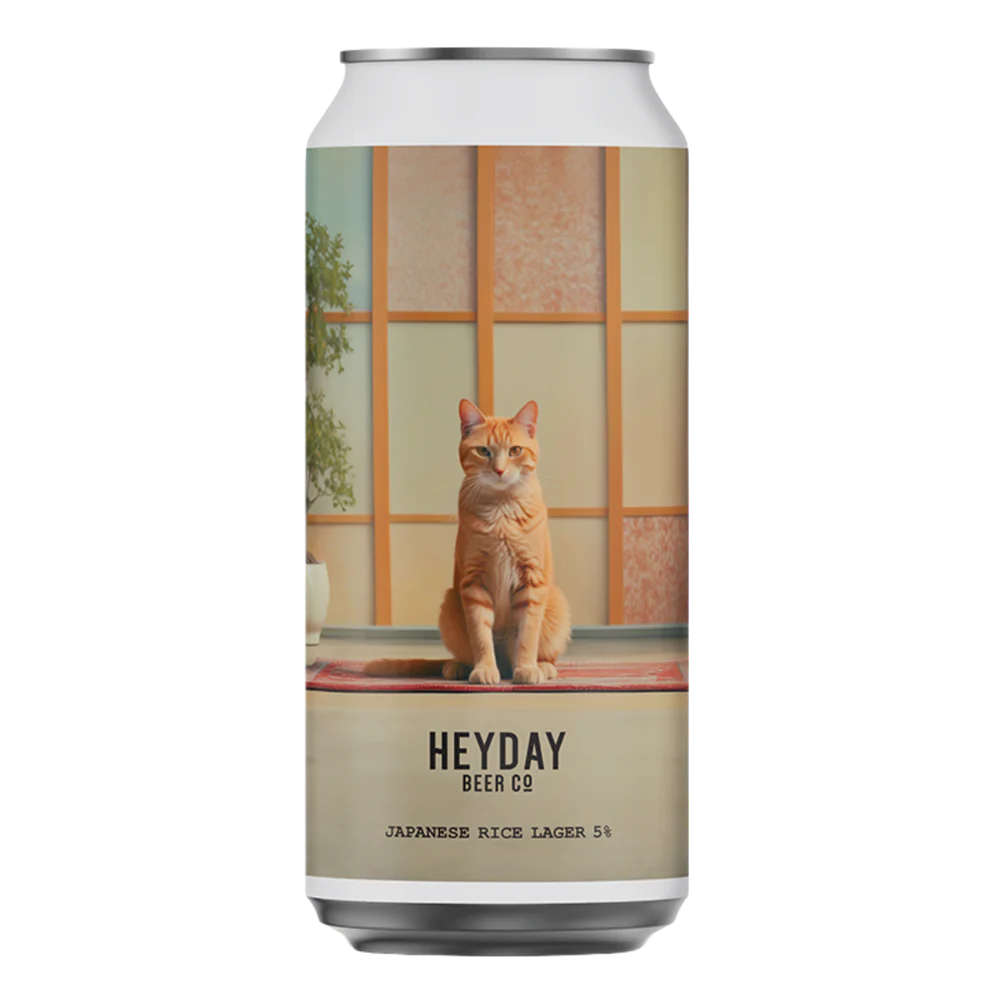
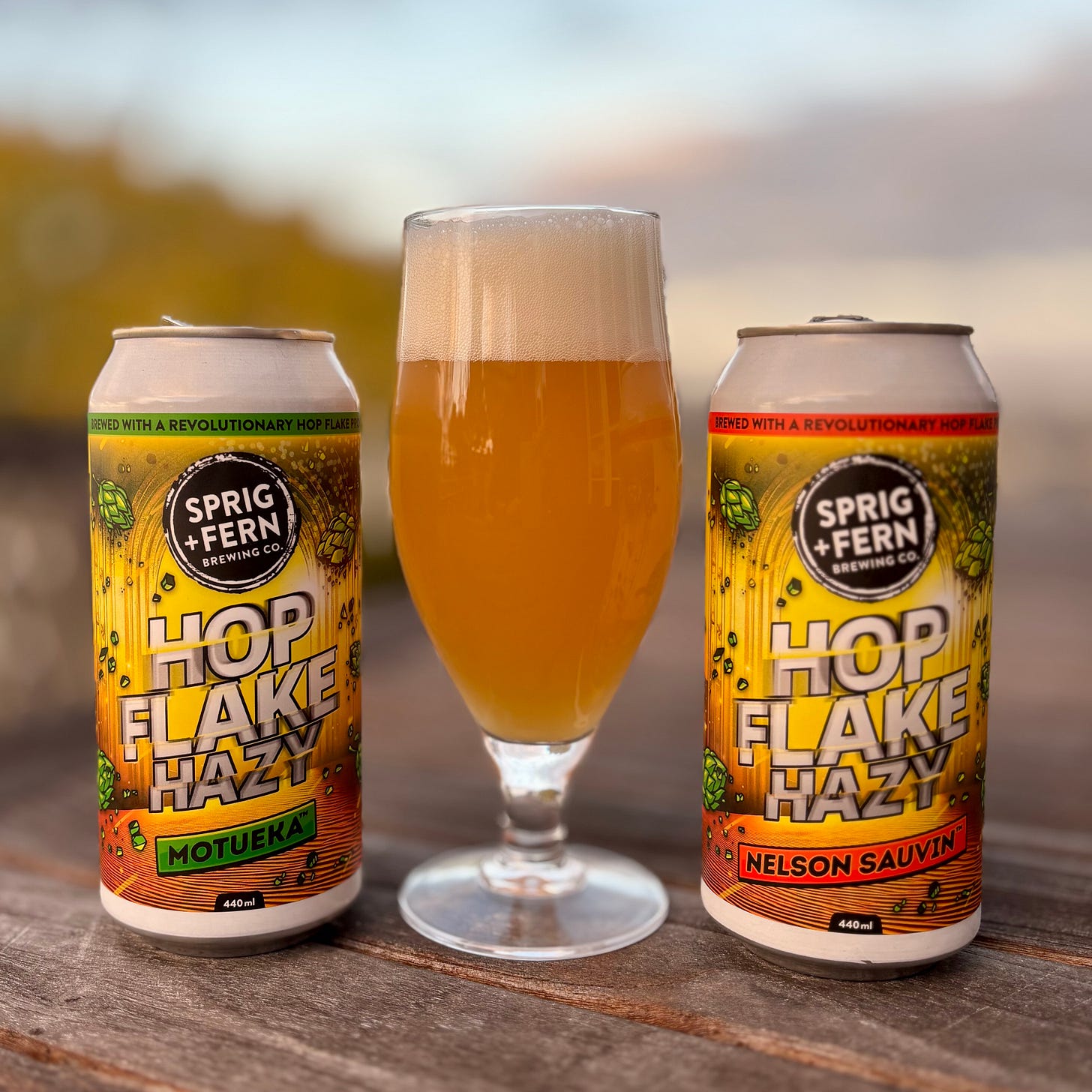


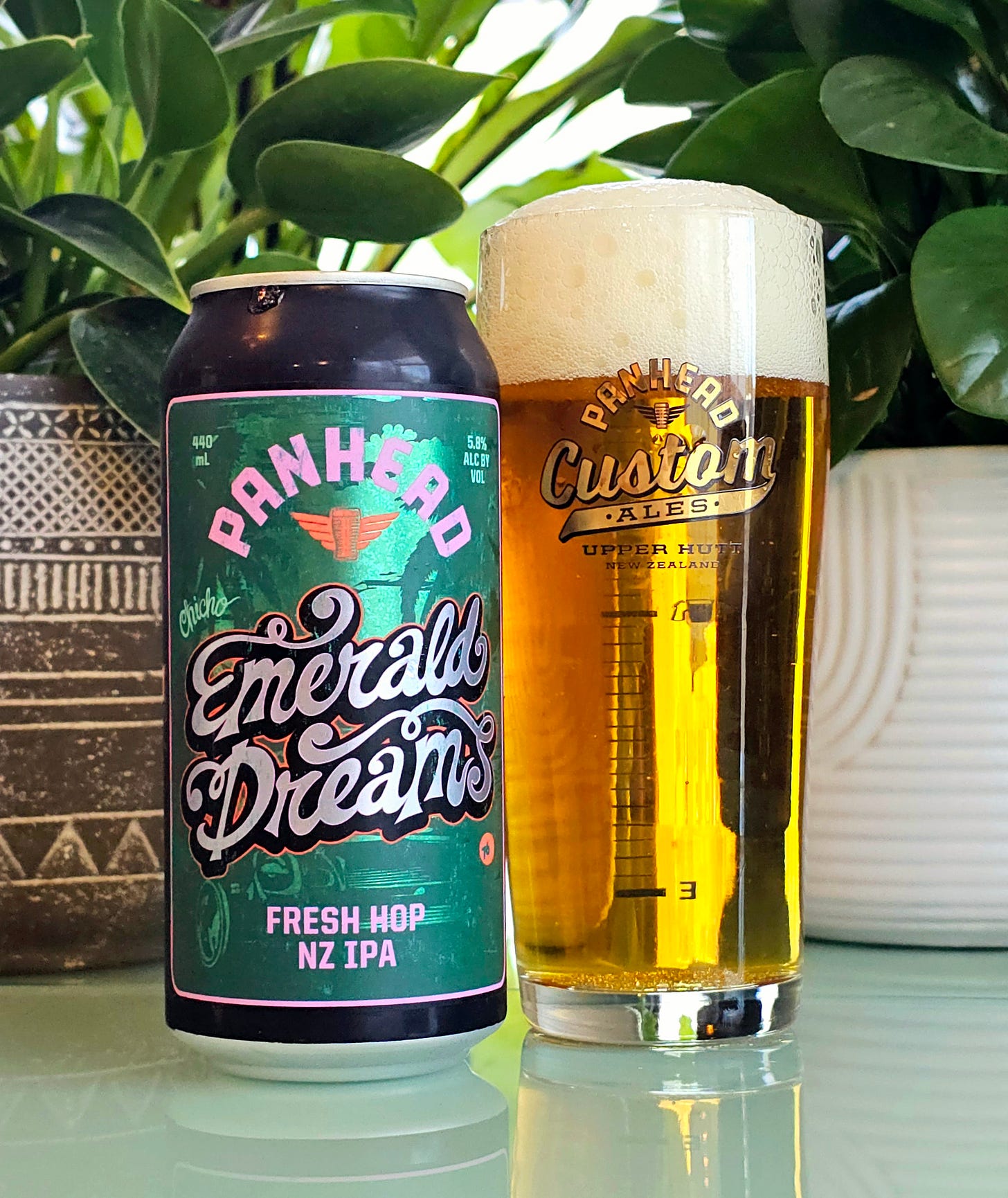
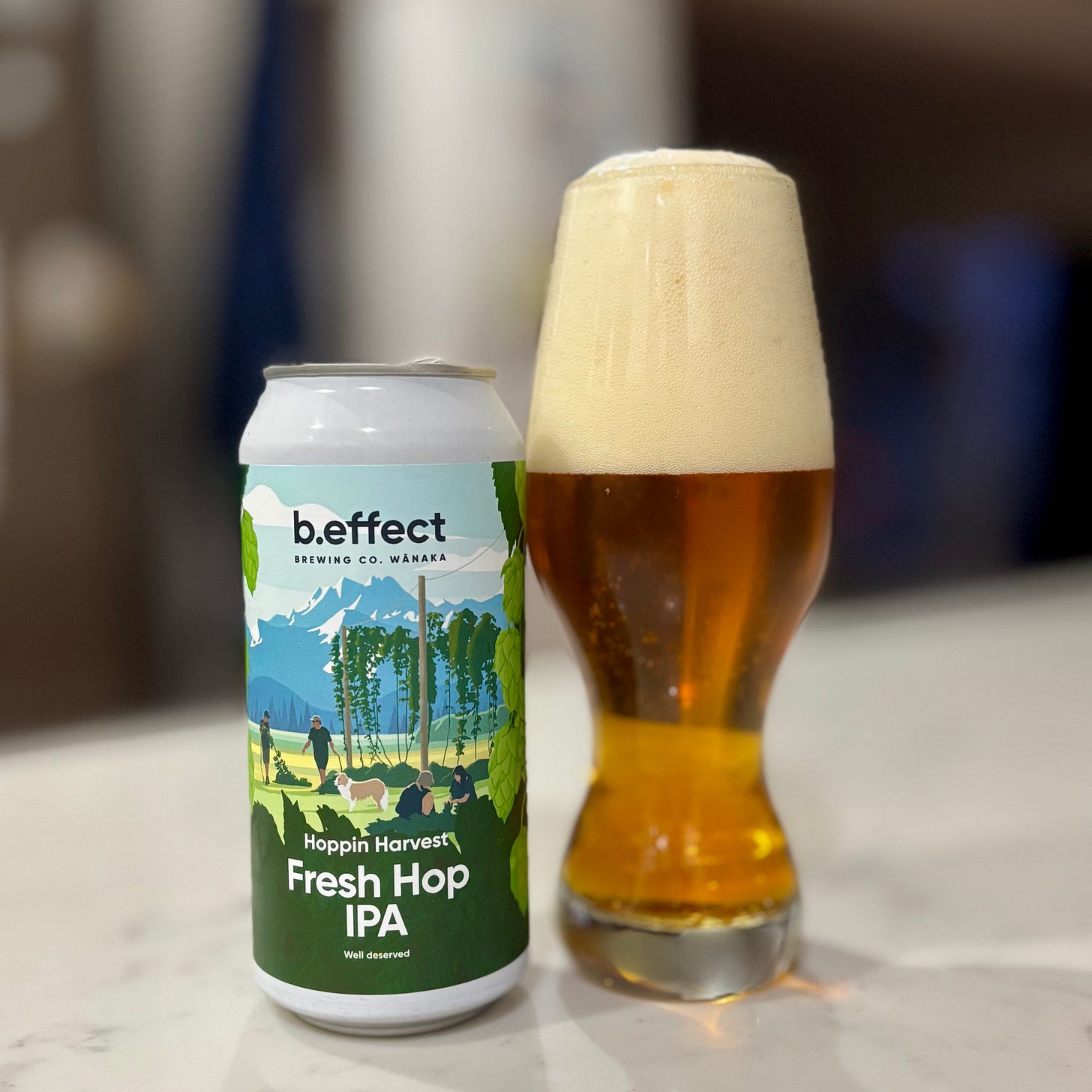
Re drunken monkeys:
https://untappd.com/user/IronmanLTFC/checkin/1439261020
I was wondering if the birthday Emerson’s Pilsner was going to be organic after Greg mentioned it was a celebration year. Your articles has answered that question. Cheers